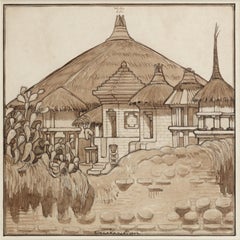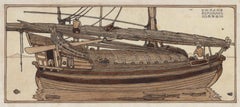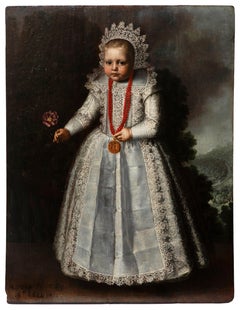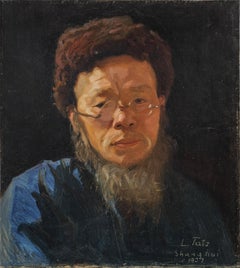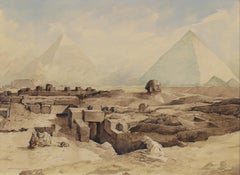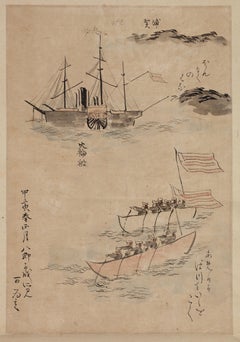Zebregs&Röell Art
to
1
34
30
25
16
16
1
17
5
4
3
5
Overall Height
to
Overall Width
to
5
5
1
1
28
12
11
10
7
7
6
5
4
4
3
3
2
2
2
2
2
2
2
1
5
10
19
1
5
1
6
2
2
1
1
1
22
18
15
13
10
Located in Amsterdam, NL
House temple in Singaradja, 1904
Signed with initials upper centre and described with location and date, lower ...
Category
Late 19th Century Still-life Drawings and Watercolors
Materials
Paper, Ink, Pencil
Located in Amsterdam, NL
'A Buginese boat, Semarang 1898’
Signed, dated, and annotated, upper right Pen, brush and ink on cardboard, H. ...
Category
Late 19th Century Landscape Drawings and Watercolors
Materials
Paper, Ink, Pencil
Located in Amsterdam, NL
David Finsonius (Veere 1597- Bergen op Zoom 1646/1648)
Portrait of a girl with a rose and a red coral necklace
With traces of the artist’s signature and annotated AETATIS S.V. 2 1⁄2 Ao 1631
Oil on panel, H. 104.5 x 79.5 cm
Provenance:
Purchased by Jonkheer Helenus Marius Speelman (1857-1909), Kasteel de Wittenburg; thence by
descent
The work shows a strong resemblance to a portrait by Finsonius in the North Brabant Museum. This
signed and dated "Girl with Basket and Cherries" (Inv. 15529), was painted just a year later, in 1632.
Not only are the paintings remarkably similar in overall size and format, in painting style, and in the
positioning of the girls in full length in their white lace dresses. They are also connected by the
iconographic scheme of the respective coral necklaces, each with a gold memorial medal hanging
from it. Although they are of course individuals, the faces are very similar in their depictions of
features such as eyes, nose, and lips. This points to the same technique applied by the same painter.
Finally, the handwriting is almost the same on the works by Finsonius known so far.
About the painter, David Finson named 'Finsonius' (related to the better-known Louis Finson...
Category
17th Century Dutch School Portrait Paintings
Materials
Oil, Wood Panel
Located in Amsterdam, NL
Lazlo Tatz (Hungary 1888 - Philippines 1951)
Portrait of a Chinese man
Oil on canvas,...
Category
Early 20th Century Portrait Paintings
Materials
Canvas, Oil
By Marius Bauer
Located in Amsterdam, NL
Marius Bauer (1867-1932)
‘Devotie in de Woestijn’ (Devotion in the Dessert near the pyramids of Gizeh, circa 19...
Category
Early 20th Century Impressionist Landscape Drawings and Watercolors
Materials
Paper, Ink, Watercolor, Pencil
Located in Amsterdam, NL
Attributed to Ukita Ikkei (1795-1859)
Hanging scroll painting of the Ame...
Category
Mid-19th Century Edo Figurative Drawings and Watercolors
Materials
Paper, Ink
Located in Amsterdam, NL
Wilhelm Heine (Dresden 30 January 1827-Löbnitz 5 October 1885)
‘Funeral of Robert Williams in the cemetery of the Temple Gyokusen-ji at Shimoda in April 1854’
With a sticker on the reverse of the frame by Coupil & Co. 1855
Watercolour on paper, H. 57 x W. 92 cm
Depicted is the Bay of Shimoda with seven American ships including the two paddle-wheel warships USS Mississippi and Susquehanna. On the Gyokus- en-ji temple grounds on the right is the coffin in the middle with the remains of US marine Robert Williams, ready to be lowered into the grave. Looking on from the left are the Buddhist monks and Japanese officials who joined the first Christian funeral on Japanese soil. Around the grave are US marines, Commodore Perry...
Category
Mid-19th Century Figurative Drawings and Watercolors
Materials
Paper, Ink, Watercolor, Gouache
Located in Amsterdam, NL
Charles Frederick de Brocktorff (1775–1850)
‘Camelopard – a present from the Pacha of Egypt to the King – at Malta on its way to England’
Signed and dated C.F. de Brocktorff. / 1827. lower right, inscribed as titled in the painted margins lower centre. Pencil and watercolour heightened with gold paint and gum arabic on paper, 36.8 x 27.9 cm
A gift so majestic, it made kings blush, and a gift so grand, it would startle Europe into a craze. Pasha Muhammad Ali of Egypt (1805-1848) did it in 1827: he sent to Europe three magical spotted, horned creatures, each with a neck reaching the skies and legs as long as a house is high. One giraffe to King Charles X of France, one to Francis I of Austria and the most fabled one to King George IV of England. A curious sight for Europeans, who had not seen such a beast since the Medici giraffe in 1487.
Few animals created more of a stir in Europe than these royal...
Category
1820s Naturalistic Animal Drawings and Watercolors
Materials
Gold
By Christoffel Lubieniecki
Located in Amsterdam, NL
CHRISTOFFEL LUBIENIECKI (1659-1729)
Pair of portraits of a gentleman and a lady, both in silk kimono, before a country house (circa 1680)
Indistinctly signed “C.......” on a box under the man’s left hand
Oil on canvas, 79.5 x 67 cm each
Both sitters are portrayed wearing a silk “Japanese” coat. During the second half of the seventeenth the Japanese silk coat, an adapted Japanese kimono, became a real vogue in the Dutch elite. The exclusive Dutch trade contacts with Japan can explain the popularity of the kimono-style silk coats in the Netherlands. Everybody who could afford one, dressed in such a fashionable and comfortable coat and, like the present sitters, some proud owners had themselves portrayed in a “Japanese” coat often together with an oriental carpet to underline their standing and international connections. These portraits are the work of the Polish-born portraitist Christoffel Lubieniecki (also known as Lubienitski, Lubinitski or Lubiniecki)
Lubieniecki was first trained in Hamburg under Julian Stuhr and after 1675 in Amsterdam under Adriaen Backer and Gerard de Lairesse. He specialized in landscapes, generally of an Italianate character, and in portraits. The loving execution of these contented burghers, enjoying the garden vistas of their country house, places him alongside Amsterdam portraitists such as Constantijn Netscher and Michiel van Musscher...
Category
1680s Old Masters Portrait Paintings
Materials
Canvas, Oil
Located in Amsterdam, NL
Follower of Zacharias Wagener (1614-1688)
Tamanuâguasû (Giant Anteater)
On Italian 17th or 18th-century paper, H. 28 x W. 43.5 cm
The present painting is a copy after Wagener’s painting of the anteater, Tamanduá-bandeira, which is illustrated in his “Thier Buch”, with 109 drawings of Brazilian fish, birds and mammals, published in Amsterdam c. 1641, in German.
Zacharias Wagener, or Wagenaer in Dutch, (Dresden 1614 – Amsterdam 1668) was a real adventurer who became Opperhoofd on Deshima and Governor of the Cape of Good Hope in the service of the VOC. During the Thirty-Year War in Germany Wagener tried his luck in Amsterdam where he worked for the map-maker Willem Blaeu. In 1634 he joined the WIC and left for Dutch Brazil where he worked as writer and painter, together with Frans Post...
Category
Early 18th Century Old Masters Animal Drawings and Watercolors
Materials
Paper, India Ink, Gouache
By Theo Meier
Located in Amsterdam, NL
Theo Meier (1908-1982)
View of the Village of Iseh, painted from the house of Theo
Signed and dated 48 Theo Meier lower left
Oil on canvas, 68.5 x 50 cm
In original frame carved by the artist.
Note:
Theo Meier arrived in Bali in 1936 with the intention of going on to Tahiti where he had been before. However Bali turned out to be the paradise he had been searching for in his dreams and he had no desire any more to move elsewhere. Bali at that time was still a very traditional place where society lived according to an acient religious system and in a luscious tropical setting the modern world was ignored. Here he met Walter Spies...
Category
Mid-20th Century Expressionist Landscape Paintings
Materials
Canvas, Rosewood, Oil
Located in Amsterdam, NL
European artist (early 20th century)
Two study portraits of Mas MarCo Kartodikromo (1890-1932)
One inscribed K...
Category
Early 20th Century Romantic Portrait Drawings and Watercolors
Materials
Paper, Crayon
By Theo Meier
Located in Amsterdam, NL
Theo Meier (1908-1982)
“A Balinese woman with offerings”
Signed, dated '36 and annotated Mankok (the name of the sitter) lower left
Sanguine on paper, measures: 57 x 41.5 cm
In a handmade and hand painted frame with address: Max Kno¨ll, Herberggasse 4/1, Basel.
Provenance:
Private collection, Basel (acquired directly from the artist)
Private collection, London
Note:
Theo Meier was born in Basel, where he attended art school and became a successful portrait painter. However, after visiting an exhibition in Basel of Tahitian paintings by Paul Gaugin, he decided to follow in Gaugin’s footsteps and go to the South Pacific. To finance his voyage, he founded a club in which every member pledged a monthly sum in return of which they could choose one of Meier’s paintings upon his return.
In 1932, at the age of 24, he embarked on his voyage to the South Sea. In Tahiti, he certainly discovered the beauty of the colours of the tropical world but the simplicity of the inhabitants, he had seen in Gaugin’s paintings turned out to be more in the artist’s fantasy than in reality. He returned to Basel but in 1935 again was on his way to the South Sea. In 1936 he arrived in Bali, planning to stay there for two or three weeks, but thirty years later he was still there. In Bali “a delirium laid hold of me which even today has not subsided”, he was to write much later. The present drawing was made during his first “delirius” year in Bali. In Bali, he settled and found inspiration and friendship with other artists including Walter Spies...
Category
1930s Expressionist Portrait Drawings and Watercolors
Materials
Paper, Crayon
Located in Amsterdam, NL
Wobbly bridge, Tabanan, Bali, 1937
Signed with initials bottom right and dated, bottom left
Pencil and ink on ...
Category
1930s Art Nouveau Landscape Drawings and Watercolors
Materials
Paper, India Ink, Pencil
Located in Amsterdam, NL
Four outrigger proa’s on the beach of Kusambe, Bali, 1937
Signed with initials, dated and described with location bottom left
Pencil and ink on paper, 29.7 x 35 cm
In ebonized frame with white mount
WILLEM OTTO WIJNAND NIEUWENKAMP
(1874-1950)
Nieuwenkamp was born on July 27th 1874 in Amsterdam. His father owned sailing ships sailing to Indonesia and hearing the stories of the returning captains evoked in the young Nieuwenkamp an obsession for distant lands and adventure. After a failed attempt by his father to have his son make a career in his business, Nieuwenkamp attended the Academy for Decorative Art in Amsterdam. However, he left within one year to go his own way.
He was an autodidact and a great experimenter with new techniques, particularly in the art of etching. Nieuwenkamp was a very focused man with the discipline of a scientist tempered by the sensitivity of an artist, a lust for adventure, a natural appreciation for ethnic arts and an enormous ambition to tread new paths.
In 1898 he visited Indonesia for the first time and on his second visit in 1903-1904 he went on to Bali and became the first foreign artist to love Bali and the Balinese with a passion. Having secured agreements with several museums in the Netherlands to obtain Balinese art and objects for their collections, Nieuwenkamp immediately started to purchase and order a wide range of ethnographic art and objects from local artists and craftsmen.
Through his drawings and books, he gave an excellent impression of Balinese art and culture at that time. Since 1854 Northern Bali was under Dutch...
Category
1930s Art Nouveau Landscape Drawings and Watercolors
Materials
Paper, India Ink, Pencil
Located in Amsterdam, NL
Statue of Vishnu Garuda, Bali, 1904
Signed with initials
Pencil and ink on paper, 21.4 x 21.3 cm
Literature:
...
Category
Early 1900s Art Nouveau Landscape Drawings and Watercolors
Materials
Paper, Pencil, India Ink
Located in Amsterdam, NL
Four Balinese, 1910
Signed and dated bottom left
Pencil and ink on paper, 15.6 x 23 cm
In ebonized frame with white mount.
Literature:
W.O.J. Nieuwenkamp, Zwerftochten op Bali, Amsterdam, 1910, p. 36
WILLEM OTTO WIJNAND NIEUWENKAMP
(1874-1950)
Nieuwenkamp was born on July 27th 1874 in Amsterdam. His father owned sailing ships sailing to Indonesia and hearing the stories of the returning captains evoked in the young Nieuwenkamp an obsession for distant lands and adventure. After a failed attempt by his father to have his son make a career in his business, Nieuwenkamp attended the Academy for Decorative Art in Amsterdam. However, he left within one year to go his own way.
He was an autodidact and a great experimenter with new techniques, particularly in the art of etching. Nieuwenkamp was a very focused man with the discipline of a scientist tempered by the sensitivity of an artist, a lust for adventure, a natural appreciation for ethnic arts and an enormous ambition to tread new paths.
In 1898 he visited Indonesia for the first time and on his second visit in 1903-1904 he went on to Bali and became the first foreign artist to love Bali and the Balinese with a passion. Having secured agreements with several museums in the Netherlands to obtain Balinese art...
Category
1910s Art Nouveau Landscape Drawings and Watercolors
Materials
Paper, Pencil
Located in Amsterdam, NL
Stone statue in the temple at Madura, India, 1914
Signed with initials and dated, bottom left
Pencil on paper,...
Category
1910s Art Nouveau Landscape Drawings and Watercolors
Materials
Paper, Pencil
Located in Amsterdam, NL
Stone statue in the temple at Madura, India, 1914
Signed with initials top right
Pencil on paper, 21.2 x 16.7 ...
Category
1910s Art Nouveau Landscape Drawings and Watercolors
Materials
Paper, Pencil
Located in Amsterdam, NL
Part of the ring-wall of the Taj Mahal, Agra, India, 1914
Signed with initials and dated bottom right
Black ch...
Category
1910s Art Nouveau Landscape Drawings and Watercolors
Materials
Paper, Chalk
Located in Amsterdam, NL
Incoming rain, Den Pasar, Bali 1937
Signed with initials, dated and titled, bottom right
Black chalk and ink o...
Category
1930s Art Nouveau Landscape Drawings and Watercolors
Materials
Paper, Graphite
Located in Amsterdam, NL
Ida Bagoes Ketut Diding, Artist on bali 1937
Signed with initials, dated and titled, bottom centre
Black chalk...
Category
1930s Art Nouveau Landscape Drawings and Watercolors
Materials
Paper, Graphite
Located in Amsterdam, NL
Young boy at Loemboeng, 1918
Signed with initials and dated, bottom right
Black chalk on paper, 25.7 x 10 cm
...
Category
1910s Art Nouveau Portrait Drawings and Watercolors
Materials
Paper, Graphite
Located in Amsterdam, NL
Jacob Eduard Van Heemskerck Van Beest (1828-1894)
“Avondge...
Category
19th Century Romantic Landscape Paintings
Materials
Canvas, Oil
Located in Amsterdam, NL
ERWIN BINDEWALD (1897-1950)
Two men playing draughts, a girl with the red book standing behind them
Signed and dated E. Bindewald d.j., 27
Oil on canvas, 140.5 x 90.5 cm
In black and gilt gesso frame.
Note:
Bindewald was born in Charlottenburg. He moved to Berlin in 1914 where he studied till 1924 at the Berliner Kunst Akademie. Bindewald travelled in Europe, but mainly stayed in Germany and certainly never was in China. This painting was made in Europe, presumably in the China Town of Berlin. Bindewald received several commisions in Germany from factory owners who wanted their factories painted inside, usually with workers, as well as outside. In the present painting the sitter on the right seems to be a man with a Manchurian background, wearing the brown coat reserved for the highest aristocracy in China.
In China the black sleeve-ends completely cover the hands, indicating that the high aristocracy does not have to do any manuel labour. This man clearly is not a factory worker but he possibly is the (co)- owner of the factory in the background and as such might need his hands to do at least some writing. The man on the left in the modern Western suit...
Category
1920s Art Deco Portrait Paintings
Materials
Canvas, Oil
Located in Amsterdam, NL
Abraham Johannes Romswinckel (1810-1856)
Self-portrait in Indonesian landscape...
Category
1820s Romantic Portrait Paintings
Materials
Canvas, Oil
Located in Amsterdam, NL
Charles Legrain, (19th century)
Two Javanese landscapes
Both signed Legrain Ch. and one dated 1857
Both oil o...
Category
Mid-19th Century Romantic Landscape Paintings
Materials
Canvas, Oil
By Roland Strasser
Located in Amsterdam, NL
Roland Strasser (1895-1974)
"Japanese Geisha"
Signed lower right
Oil and gold...
Category
1930s Expressionist Portrait Paintings
Materials
Gold Leaf
Located in Amsterdam, NL
GOVERT VAN EMMERIK (1808-1882)
View on the Governor’s Palace in Paramaribo, S...
Category
19th Century Naturalistic Landscape Paintings
Materials
Canvas, Oil
Located in Amsterdam, NL
FRANÇOIS MATHURIN ADALBERT, BARON DE COURCY (1805-1839)
'Le Negrito à l’ancre. Dans le port de la havanne'
Indistinctly signed lower left
Titled on the mount
Pencil and watercolour, heightened with white, on paper, 24.8 x 34.6 cm
Literature:
The present watercolour will be illustrated in:
- Prof. Manuel Garcia’s projected book on the disease and the slave trade provisionally titled “Fighting the Yellow Demon of Fever: The Struggle against Disease in the Illegal Slave Trade”.
- Prof. Micael Zeuske’s forthcoming Global history of slave trade.
Exhibited:
Mexico City, 1998, Palacio Virreinal, El Barón de Courcy, illustrationes de un viaje, 1831-1833, no. 108
Note:
Baron de Courcy was in the Caribbean in late 1832 and early 1833, following his tour of Mexico in 1832, on the last leg of his “Grand Voyage...
Category
Mid-19th Century Old Masters Figurative Drawings and Watercolors
Materials
Paper, Watercolor, Gouache, Pencil
Located in Amsterdam, NL
Study of a dog
Oil on paper laid down on panel, 17.5 x 25.5 cm
Provenance
Private collection, the Netherlands
Note:
We are grateful to Mr Fred Meijer for his attribution to Ludolf de Jongh
Ludolf de Jongh was the son of a shoemaker. When his father moved to Rotterdam, the young Ludolf decided to learn art rather than shoemaking and became a pupil of Cornelis Saftleven. Later he studied under Anthony Palamedes in Delft and still later with Jan van Bijlert in Utrecht.
In 1635 he travelled to France with Francis Bacon. Seven years later, in 1642, he returned to the Netherlands when he heard that his mother had fallen ill. He set up a shop in Rotterdam, and his earliest signed paintings date from that year.
According to Houbraken, his travels had caused him to speak French so fluently, that his parents had to learn French in order to speak with him.
De Jongh’s work shows a strong influence from the Utrecht school of Caravaggio admirers, especially Jacob Duck...
Category
Mid-17th Century Old Masters Animal Paintings
Materials
Paper, Oil, Wood Panel
Located in Amsterdam, NL
Joseph-Marie Vien (1716-1809)
‘Ambassadeur de Siam’ and ‘La Sultana Reine’
Both titled lower centre, the drawi...
Category
Mid-18th Century Old Masters Figurative Drawings and Watercolors
Materials
Paper, Pencil
Located in Amsterdam, NL
‘Zulu Dancers’
Signed bottom right Hardman, titled on a sticker at the reverse and with address Walton End, Wal...
Category
20th Century Expressionist Nude Paintings
Materials
Oil, Board
Located in Amsterdam, NL
A sawah landscape, Sumatra
Signed and dated 'Sonnega '54' (lower right), and annotated 'Voor Jan de Bas 1-1-1970 / R de Bas' (on the reverse)
oil on canvas, 50,5x60,5 cm
Provenance:
- Collection Pieter de Bas (1909-1979) Mr de Bas was head of the MULO school and acting head of the HBS school in Medan. Thence by descent to the present owner.
Exhibited:
- Hotel de Boer, Medan 1954, where acquired by the first owner.
The light I observed everywhere was of a special quality, fluorescent blue, shone from nowhere but radiated from every point, oddly with great depth and intensity. The light in an entirely different dimension came from nowhere and went nowhere shimmering with the glow of a bright blue jewel. The most important thing I discovered was of being omnipresent and able to understand everything at the same time, yes I could fathom creation completely.
Auke Sonnega, born March 9, 1910 in Leeuwarden, known as the painter, primarily of young Balinese men and women.
Originally raised in the reformed denomination, the parents of Auke apparently practised theosophy and their children, including Auke were taught these principles. The talent for drawing revealed itself at an early stage which in 1926 lead to a 4-year study of textile design at the Academy for Art and Craft in Amsterdam.
He completed the academy in 1930 and worked in a carpet factory in Twente until 1934 and then followed in his sister Aafje’s footsteps leaving the Netherlands to go to the Dutch East Indies where in 1935 he started working as a graphic designer with an advertising bureau in Batavia. He was able to travel through Java and Bali on the motorbike that he brought with him from Europe, and was paid for his travelogue, enhanced with his own photo’s which appeared in several Dutch newspapers and magazines.
In the 1930’s two Europeans, Walter Spies and Rudolf Bonnet...
Category
Mid-20th Century Expressionist Landscape Paintings
Materials
Canvas, Oil
